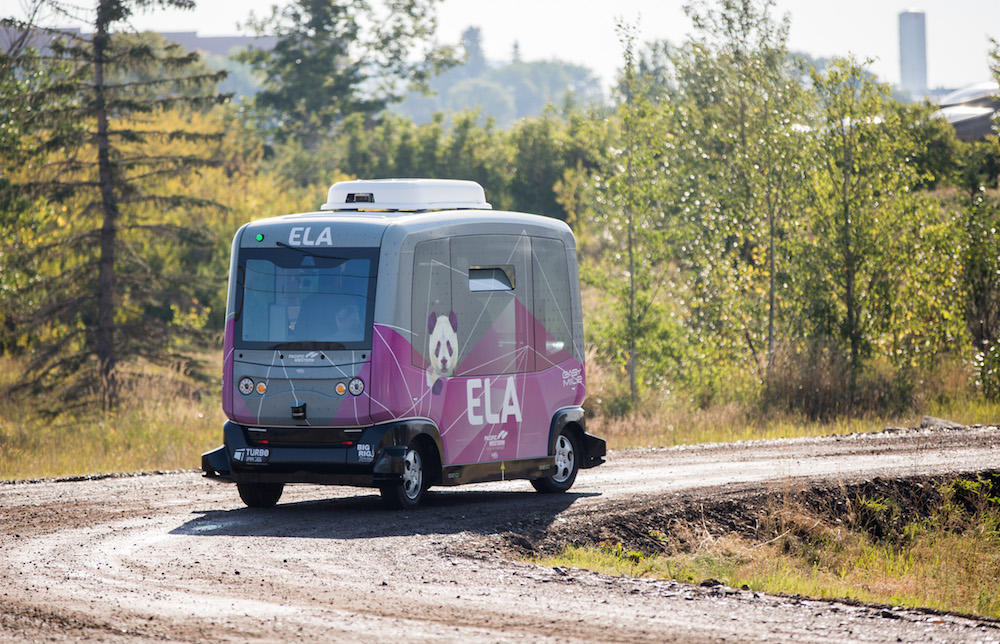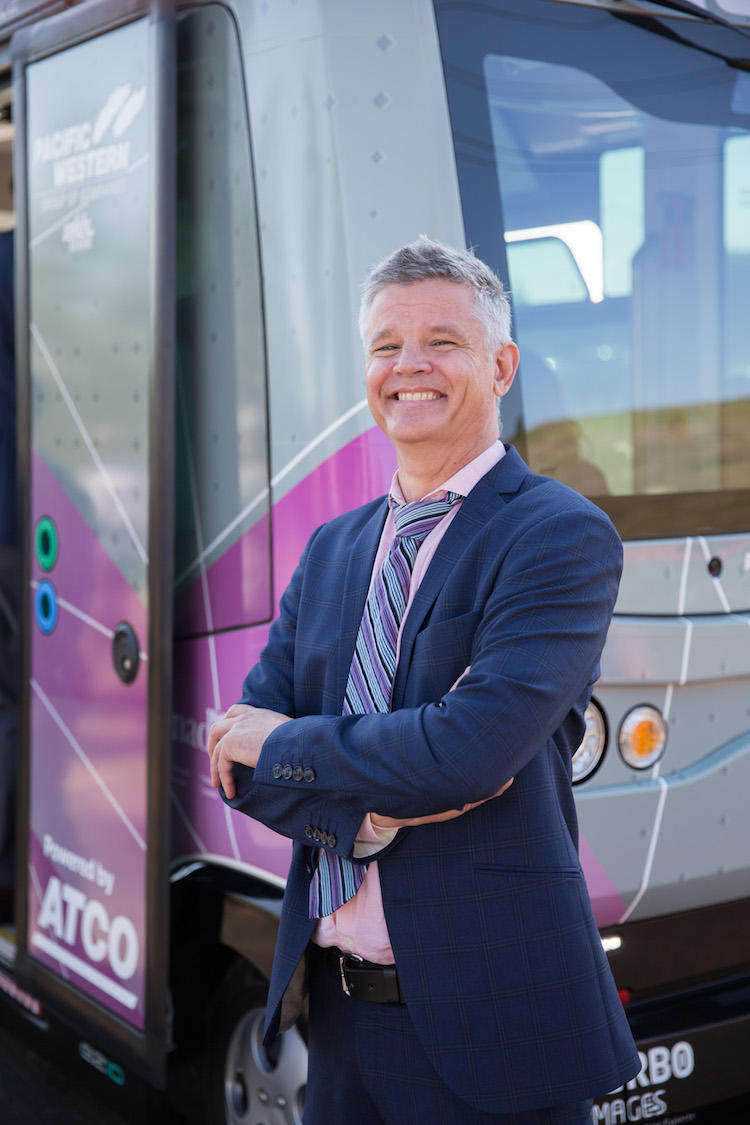Sept. 6, 2018
Take a ride in a driverless vehicle in September

The ELA, or “Electric Autonomous,” is a fully-accessible 12-person autonomous vehicle.
Adrian Shellard, for the University of Calgary
If you’ve ever wondered what it might be like to experience the future of driving, your ride has arrived. Plus, by going for a ride, the public can help University of Calgary researchers study autonomous vehicles (AV).
From Sept. 8 to 30, a free, low-speed (12 kilometres per hour), autonomous vehicle shuttle service will run on a one-kilometre stretch between the Telus Spark Science Centre and the Calgary Zoo LRT.
The ELA, or “electric autonomous,” is a fully-accessible 12-person vehicle. The project, a first-of-its-kind application of an autonomous vehicle for public transportation in Western Canada, is being run by the City of Calgary in collaboration with Alberta-based Pacific Western Transportation.
Research on the ELA will be conducted as part of the Urban Alliance, a strategic partnership between the University of Calgary and the City of Calgary. The Urban Alliance promotes the transfer of cutting-edge research to tackle challenges and find ways to make life better for all Calgarians.
"Autonomous vehicle use is coming faster than we might think," says Dr. Robert Ferguson, PhD, associate professor in the Faculty of Science. Ferguson will study the use of fibre optic cables for tracking the movements of autonomous vehicles on the road, which could provide a more accurate account of what happens in the instance of a collision than what is provided by a vehicle's internal system. "We think that our research will be important in providing 'ground truth' in the event of autonomous vehicle accidents."
“The University of Calgary is a research leader in technology for autonomous vehicles, including geomatics engineering, data security, and transportation systems optimization,” says Dr. Ed McCauley, vice-president (research). “We’re pleased to be partnering with the City of Calgary and Pacific Western Transportation on the ELA project by conducting research that will help inform decision-making around how our city uses autonomous vehicles in the future.”
Throughout the trial, three UCalgary researchers will conduct projects on autonomous vehicles. For riders who wish to participate in research, the project led by Dr. Lina Kattan, PhD, may be of interest:
Calgarians’ attitudes and perceptions towards automated low-speed transit
Dr. Lina Kattan, PhD, Schulich School of Engineering
This project will examine Calgarians’ perceptions of automated vehicles both before and after they ride the ELA shuttle. In five- to 10-minute interviews, riders will be asked to describe their experience on the shuttle, what factors contribute to their responses and how they feel about autonomous vehicles being used around Calgary more widely. In particular, the researchers are interested in the use of autonomous vehicles as “last-mile” technology, to connect LRT stations with nearby destinations. Read more.

Robert Ferguson is researching using city fibre optics as sensors for autonomous vehicle movement.
Adrian Shellard, for the University of Calgary
The other projects being conducted during the project will also benefit from you riding the shuttle, even though you may not interact with the researchers directly. The projects are:
Using city fibre optic footprint as sensors for autonomous vehicle movement
Dr. Rob Ferguson, PhD, Department of Geoscience, Faculty of Science
This project will answer the question “Can we increase traffic safety with the help of sensors inside of roads that detect the location, speed, and direction of vehicles, pedestrians, and cyclists?”
One of the challenges of widespread autonomous vehicle use will be gathering accurate position data from the vehicles’ internal systems, which isn’t possible with the current limitations of GPS technology. UCalgary researchers are repurposing pipeline sensor technology to detect and collect vehicle movement information via the fibre optic cables embedded in our roads — and they’re the first in the world to do so. Read more.
Self-reported autonomous vehicle blockchain telematics
Dr. Joel Reardon, PhD, Department of Computer Science, Faculty of Science
Autonomous vehicles collect and store their own data about their movements. In the event of an accident, vehicle owners will be expected to provide the relevant stored data to law enforcement, insurance companies, or legal counsel. This presents an incentive to provide misleading or altered data if the untouched versions could reveal wrongdoing. This project aims to address this risk by building a system to ensure robust, honest reporting of autonomous vehicle movement. Read more.
The UCalgary researchers will also be presenting their AV projects — and answering questions from the public — at the Telus Spark Adults Only Night on Sept. 13.
ELA is available to ride free of charge from Sept. 8 to 30, 2018. Rides are required to be booked online.
Urban Alliance is a strategic partnership between The City of Calgary and University of Calgary to promote the seamless transfer of cutting-edge research between The City and the university, for the benefit of all our communities. Urban Alliance energizes connections between the people who make up our organizations, and encourages us to work together to find ways to make life better for all Calgarians.
